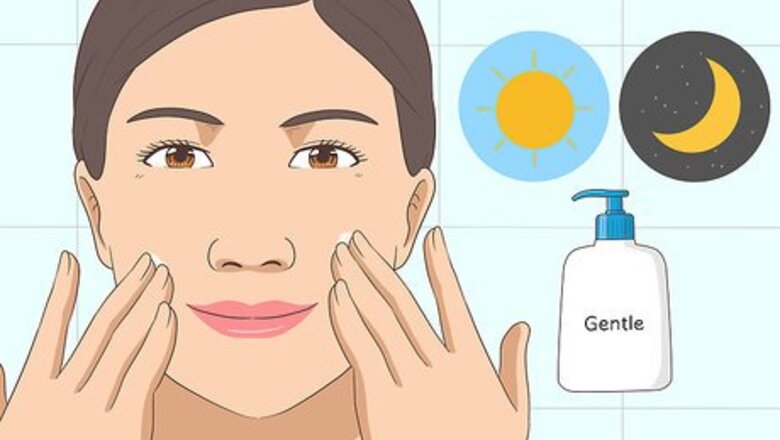
views
Preventing Oily Skin With Health Products
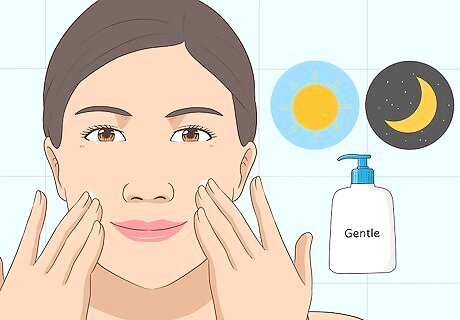
Wash your face twice a day with a gentle face cleanser. This will remove the excess oil that's clogging your pores. Dermatologists agree that using a basic face cleanser every morning and night is the best way to prevent oily skin. Choose a gentle face soap that cleans your face without drying out your skin. Don't use a moisturizing soap that adds oils or moisturizers to your face. Use warm water when washing your face. Hot water may dry out or irritate your face. Dry your face thoroughly with a soft towel after washing. Stay away from harsh soaps or facial cleansers designed to dry out skin. The purpose of washing the face is to physically remove oil and dead skin cells from your face and pores. If you choose a soap designed to dry oily skin, choose the mildest one you can find and only use it when needed. If a basic cleanser doesn't work, try a product that has acid like benzoyl peroxide or salicylic acid. These products are usually for acne, but they help to fight oily skin too.
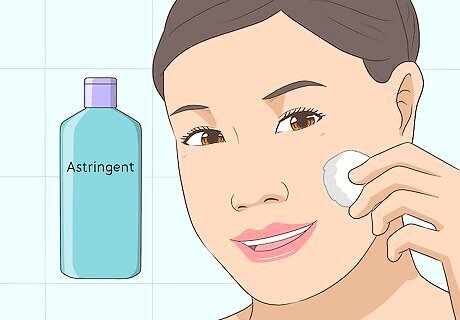
Apply toner to tighten your pores and remove oil. There are many kinds of toner. Use either an astringent or freshener to fight oily skin. Check the ingredients: astringents have alcohol while fresheners usually have ingredients like caffeine or green tea. Generally stay away from skin tonics and skin bracers because they are only for normal or dry skin. Apply the toner on the "t-zone" of your forehead and nose. Those are the oiliest spots on your face. Apply the toner very lightly or not at all to your cheeks, where it can easily cause over drying. Use cotton balls to apply to toner. Brush the cotton balls lightly over your face. After the toner dries, wash it off with a face towel and use an oil-free moisturizer to prevent over drying.
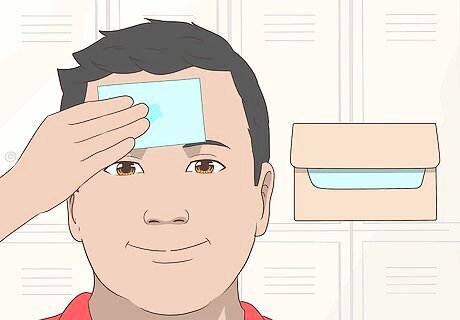
Use blotting paper and carry medicated pads for quick and easy oil reduction. Blotting paper is a great temporary fix because it doesn't dry out skin and it only takes 15 to 20 seconds. Medicated pads usually have salicylic acid or glycolic acid and are easy to use on the go. Since they're acid-based they're a great treatment for acne too. Apply blotting paper to your oiliest areas such as nose and forehead. Make sure you don't scrub it. You just have to press it on the oily area for a few seconds so it can absorb the oil. This will quickly remove any oil sitting on your skin, even though it won't prevent the oil from returning. Some blotting paper includes powder, which fights oily skin even more. Carry medicated pads in your purse or bag. These pads are typically acid-based so they fight acne too. Be careful not to use medicated pads as needed, but don't use more than three a day as they can over dry your skin.
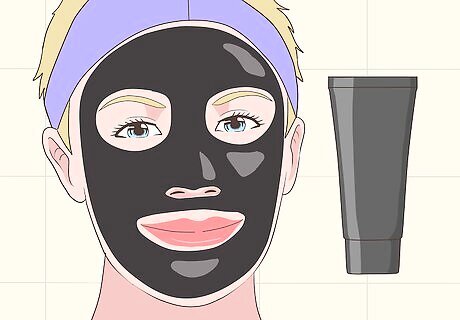
Use a deep cleaning facial mask as needed to remove excess oil. Facial masks give you a deeper cleanse than an ordinary face wash. They go deeper to remove impurities and draw out the oil in your pores. However, there is a greater risk for over-drying with facial masks. Use them sparingly. Only use a mask after using your regular face cleanser. Your skin and hands should be damp when you apply the mask. Try doing the mask in the bathtub for maximum relaxation and minimal cleanup. Keep the mask on for 10 to 15 minutes. Use water and a washcloth to gently remove the mask. Try a facial mask made with mud/clay or make your own out of yogurt. These ingredients have live cultures, which clean out pores really well and can greatly reduce oil buildup.
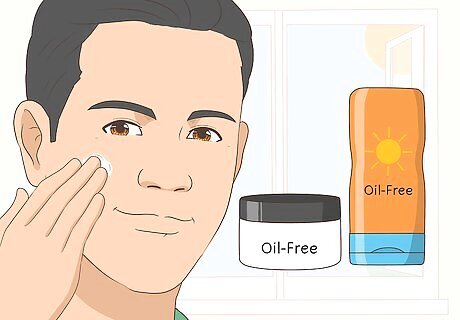
Use oil-free moisturizers and oil-free sunscreen. Read the ingredients carefully on any products you use. Choose only water-based, non-comedogenic cosmetics. Some people with oily skin don't use moisturizers or sunscreen because they think it will add to their problem. If you use the right products, however, they can be enormously beneficial to your skin. Oily skin still needs to be moisturized and protected from ultraviolet radiation. Get in the habit of checking the ingredients of every product you use on your face. Make sure none of them are oil-based. Sunscreen gels or facial powders can protect your skin without adding oil or clogging your pores. Avoid oil-based cosmetics, and wash all makeup off before going to bed. Makeup settles into pores and will clog them if it's not completely removed. Never apply additional makeup without first removing the old makeup. Don't use cold creams or lotions for makeup removal if you have oily skin. These products are designed to moisturize dry skin and may leave a greasy film on the skin, contributing to clogged pores, oil buildup, and acne.
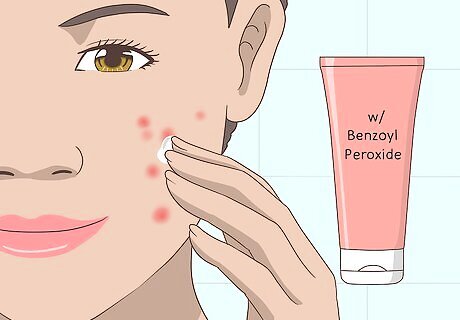
If your oily skin is causing acne, treat it with over-the-counter acne medication. Use products with benzoyl peroxide to kill the bacteria that build upon the skin and causes acne. It also cuts back on dead skin cells which clog your pores. Acne creams that contain resorcinol, sulfur or salicylic acids also help to unclog pores. These products are designed for use after acne blemishes appear on the skin and to help sores heal. Follow all manufacturer usages instructions when using over-the-counter acne products. Make sure you wash your face with soap in the shower too. Just don't wash your nose as that can cause more clogging. There are many different acne products. If the first one doesn't work, try another. If over-the-counter medications don't work, see your dermatologist for more treatment.
Preventing Oily Skin With Lifestyle Changes
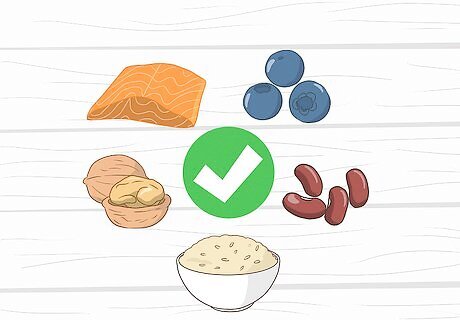
Eat a healthy diet rich in antioxidants and omega-3 fatty acids. These foods will improve the appearance and texture of your skin. Avoid foods high in fat and sugar which cause oily skin. For antioxidants, eat foods like blueberries, beans, cranberries, apples, whole grains, spinach, and peppers. In general, bright colored fruits and vegetables are high in antioxidants. For omega-3 fatty acids, eat foods like salmon, tuna, walnuts, and flaxseed. Especially if you don't eat fish, consider taking fish oil as a supplement. Avoid oily, greasy foods which aggravate oily skin conditions. Cut out unhealthy fats like in butter, beef, and fried food. Replace them with healthy fats found in foods like nuts, seeds, avocados, and fish. Eat natural foods and fresh fruits and vegetables as much as possible. Some vegetables known to be especially good for the skin include spinach, tomatoes, and carrots. In small amounts, chocolate is also proven to be good for your skin!

Get plenty of physical exercise. Physical activity has been shown to provide a range of benefits to your skin, including preventing oil. Regular exercise will help keep your skin healthy and smooth. Ease the stress in your life by exercising regularly. Aim to get physical activity four times a week. Go to the gym, go for a bike ride, or play a game of basketball with friends. Whatever you choose, make sure you're getting regular exercise. Make sure to always shower after exercise to wash away the sweat and bacteria. If you let it build up, it can lead to more skin problems. Physical stress on the body may also trigger higher levels of androgens causing the same chain reaction on oil production. People with a genetic predisposition to oily skin may have increased symptoms during menstruation or when suffering from allergies, colds and other conditions. Be prepared for this and counteract it with stress-reducing activities.
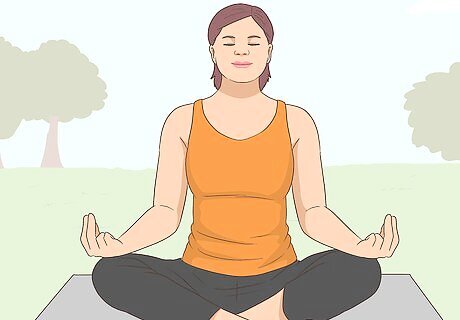
Practice relaxation or meditation techniques to cope with stress. There is a strong link between mental health and skin health. Stress is a frequent cause of acne and oily skin. Work on keeping a positive mindset by cutting out stress in you life, and your skin will thank you! The connection between stress and acne has been noticed by people for many years. Research has found that the body produces higher levels of androgens and cortisol during times of high stress. In turn, this stimulates the sebaceous glands causing them to increase oil production. Practice meditation and calming breathing. Focus on deep, slow breathing through your nose, and cut out all distractions. Feel the stress slip away. Yoga is an excellent stress reducer too. Try out a local yoga course!
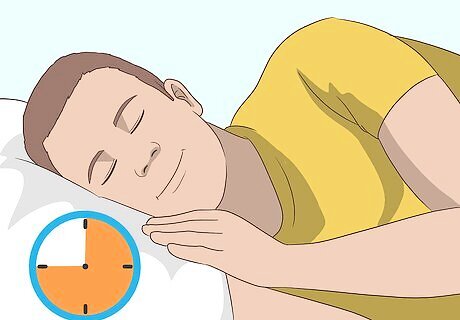
Get a full night's rest. Sleep seven to nine hours every night. Your body renews and revives you skin while you sleep. A lack of sleep interrupts your body's ability to maintain healthy skin. Sleep is also connected to stress, which can cause oily skin and acne. Get a good night's sleep to stay happy and healthy! A lack of sleep can also cause wrinkles, baggy eyes, and lackluster skin. Oversleep can also cause your skin cells to break down. Oversleeping is anything ten hours and above.
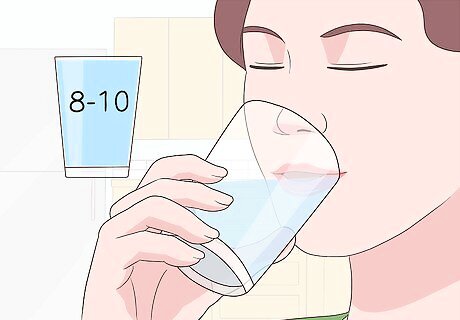
Drink plenty of water to hydrate your skin. Hydration is key to maintaining healthy skin. Water stops breakouts by giving your skin the right water to oil ratio. Doctors recommend eight to ten glasses of water a day. Inadequate water can cause wrinkles, dull skin, and more prominent pores. Likewise, dehydration and acne breakouts are frequently linked together. Dehydration triggers changes in the oil glands in your skin, causing oil to build up on your skin. Staying hydrated keeps the oil on your skin at healthier levels. Drinking lemon water is great too. It keeps you hydrated and it's rich in antioxidants and vitamin C. Lemon water is also effective for curing acne. Drink it in the morning on an empty stomach for healthy skin!

















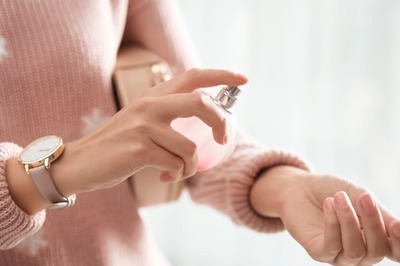


Comments
0 comment